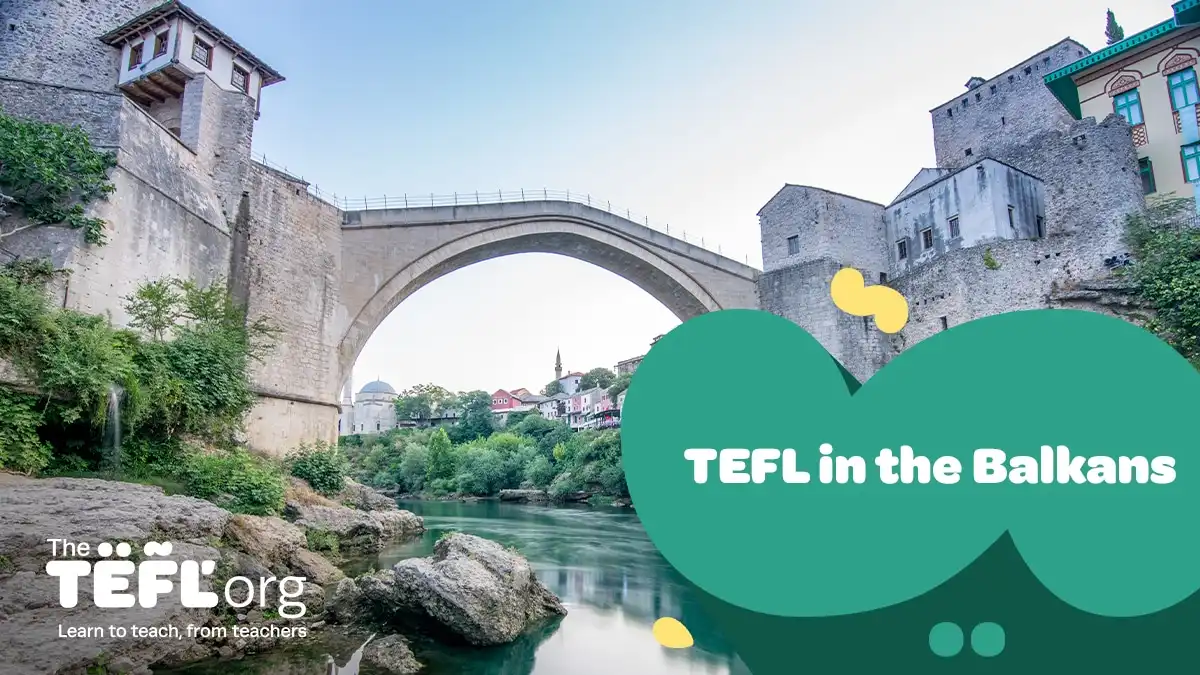- TEFL Courses
- New to TEFL New to TEFL
- Locations
- TEFL Jobs
- Teach Abroad Teach Abroad
- Teach English Abroad
- Teach English in Japan
- Teach English in South Korea
- Teach English in Spain
- Teach English in China
- TEFL Salaries Abroad
- Requirements for teaching abroad
- Teach English abroad without a degree
- How to find teaching jobs abroad without experience
- Can you teach English abroad as a non-native speaker?

- Teach Online
- About Us
- Blog
- Podcast

TEFL in the Balkans
So often, we talk of “underrated” TEFL destinations. For one, Latin America still feels like it isn’t highly rated enough for new, inexperienced teachers who want to absorb different cultures. West Asia, particularly countries like Mongolia, Kyrgyzstan and Kazakhstan, are massively under-tapped areas of potential for TEFL educators. The Caribbean, despite its many attractions, still seems underrated.
The Balkans, however, are a stand-out. These countries have rapidly growing economies, excellent facilities for tourists and permanent newcomers alike, and an appetite for English teaching that can only be described as voracious.
Generally, when we talk about the Balkan region, we’re discussing what’s understood to be the former Yugoslavia, a gigantic communist state that broke up in the 90s, as well as a few other nations. Albania, Bosnia and Herzegovina, Bulgaria, Greece, Kosovo, Montenegro, North Macedonia, the European part of Turkey, large parts of Croatia and Serbia, as well as Romania and southern parts of Slovenia - these are the regions and countries we’re referring to.
Let’s explore some of these fascinating countries, and what opportunities they bring for TEFL teachers.
The Balkans: Some context
Since the breakup of Yugoslavia, and many nations declaring independence, English proficiency has been middling to fair. Different countries, for a myriad of reasons, offer different things to citizens and visitors alike, and their proficiency in English can be a result of a range of factors.
According to
EF’s English Proficiency Index
, the variance in English proficiency across the region is considerable. Out of all nations on the index, Croatia ranks 11th, with Greece next best at 14th. Understandable, perhaps: both of these nations have massive tourist appeal, and are significant economic players in Europe.
Bulgaria is 21st in the index, with Albania 47th, Turkey 64th, and neighbouring countries such as Bosnia and Herzegovina, Kosovo, Montenegro and North Macedonia are all unranked.
What does this tell us? Both of the following are true: there is existing, robust infrastructure for teaching English in large parts of the Balkans, but there are also untapped areas for TEFL teachers who really want a challenge.
So, with this in mind, let’s have a look at some Balkan/Balkan-adjacent countries and get into some TEFL specifics! For visas, bear in mind that some Balkan states are members of the EU - if you’re an EU citizen, you won’t need a visa. Additionally, a TEFL certificate is a must, wherever you go.

Something to bear in mind
Though the Balkans, largely speaking, has moved on from the tribulations and unrest of the 90s, there are still some parts where travel might not be possible. Consult government guidance on travel before committing to a job.
Talking of committing to a job, it’s far easier to get a visa if you meet the requirements AND have a job already sorted. While applying for jobs on the ground can be fruitful, it’s recommended to have employment secured prior to heading over.
The cost of living in the Balkans, generally speaking, is much cheaper than in the west, particularly the UK and USA. So, don’t baulk (no pun intended) at the salaries; bear in mind that they’re relative to much cheaper costs for rent, products and services.
Finally, though it’s true everywhere, remember to be mindful of customs and traditions wherever you’re going in the Balkans. Respect is a major currency. Some hand signals, tones of voice and other gestures deemed perfectly acceptable in western countries mean significantly different things in other countries. For example in Greece, an open hand with stretched fingers (as though you’re giving a high-five) is considered offensive.
Albania
With two million residents and a border that looks across to Italy, the perfect Mediterranean TEFL experience awaits in Albania. With plenty of excellent international schools - particularly in the capital, Tirana - finding lucrative work should be within reach for TEFL teachers who hold a degree and a TEFL certificate.
Requirements:
- Bachelor's degree
- Work visa (obtained through the employer)
- Proficiency in English (non-native English speakers can apply).
- Some Albanian proficiency is preferred but not mandatory.
Capital city
Tirana
Typical monthly teaching salary
$500-$1,000/£392-£785
Bulgaria
The former “Communist Silicone Valley” is a centre of technology, with an excellent education system. That system includes good standards of English teaching, with skilled TEFL educators encouraged to apply for a number of different jobs. Typical of the region, expect a warm climate and a population which considers English a second language. Teaching English in Bulgaria is an opportunity you won’t want to miss.
Requirements:
- Bachelor's degree
- Type D visa and residence permit
- Evidence of English proficiency
Capital city
Sofia
Typical monthly teaching salary
$438-$657/£350-£530

Greece
What about teaching English in Greece? You won’t be surprised to learn that one of the original cradles of ideas , like western philosophy, democracy and - who knew? - chewing gum is a great place to teach English as a foreign language. While the most demand for teachers is foundis in the cities, specifically Athens and Thessaloniki, Greece has a number of beautiful islands like Corfu and Crete: find work here, and you’ll never want to live anywhere else.
Requirements:
- Bachelor's degree
- TEFL certificate
- Visa (employers can help)
- English proficiency
Capital city
AthensTypical monthly teaching salary
$790 – $1,100/£630 – £900
Turkey
Half-European, half-Asian Turkey is a truly fascinating place to teach English , with a wealth of TEFL jobs available, particularly in the northern part of the country. The capital, Istanbul, is split into two distinct regions, making it an incredibly unique place to study. The country is littered with wonders, including the Walls of Troy, The Suleymaniye Mosque, the Hagia Sophia, and the Blue Mosque.
Requirements:
- Bachelor's degree
- TEFL certification
- Evidence of English proficiency, basic Turkish
Capital city
Istanbul
Typical monthly teaching salary
$220 – $730/£170 – £575
Croatia
We’re big fans of Croatia here at The TEFL Org, and so are millions of travellers! The country, which is so much more than football and Game of Thrones, is largely coastal, meaning that beach views are pretty much guaranteed. The standard of English in Croatia is excellent, and its school system is amongst the best in Europe. Teaching English in Croatia is already very popular, meaning there’s competition for jobs, so don’t delay!
Requirements:
- Bachelor's degree is a must to gain a visa
- TEFL certification of at least 120 hours is essential
- Experience is definitely preferred!
Capital city
Zagreb
Typical monthly teaching salary
£805-£1,266/$1,015-$1,600
Serbia
Serbia is an emerging destination for TEFL teachers , offering a unique blend of cultural heritage and modern urban life. With its low cost of living and high demand for English teachers, Serbia provides an attractive option for those looking to teach in the Balkans.
Requirements:
- Bachelor's degree
- TEFL certificate
- Work visa (obtained through the employer)
- English proficiency
Capital city
Belgrade
Typical monthly teaching salary
£516-£872/$657-$1,111
Want to learn more about
teaching English in Europe
? Read our comprehensive guide to find out all you need to know!













Leave a Comment
Your email address will not be published.
(0/1500 characters)
Quick Maths Test